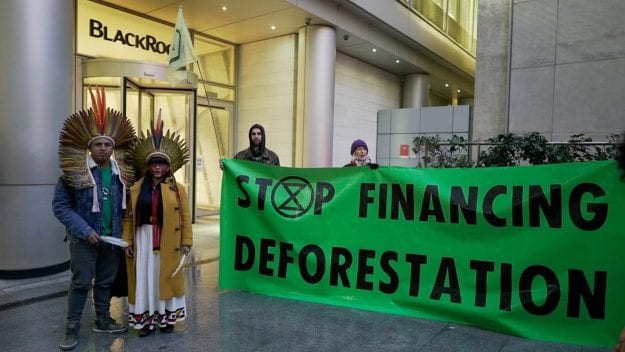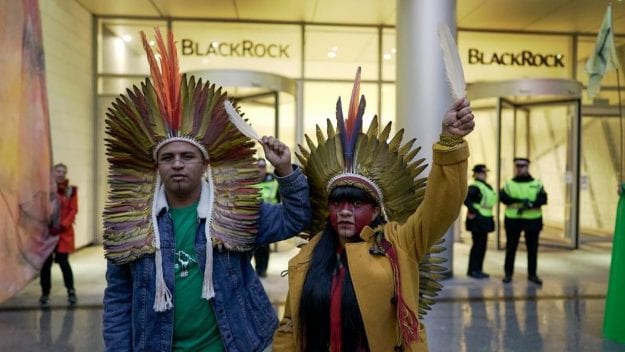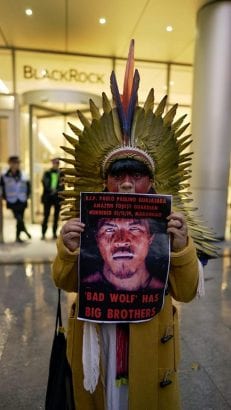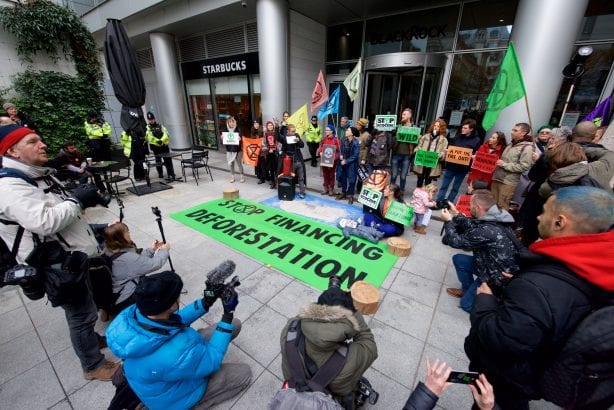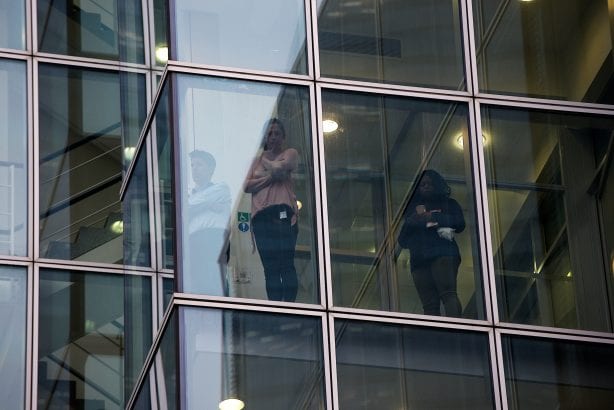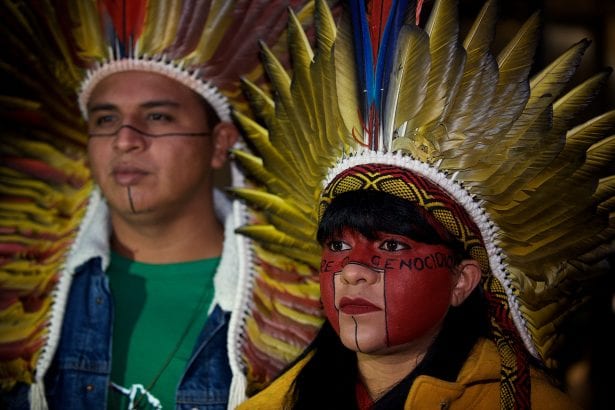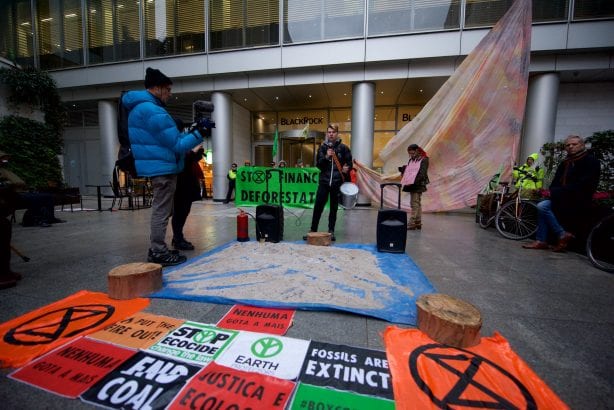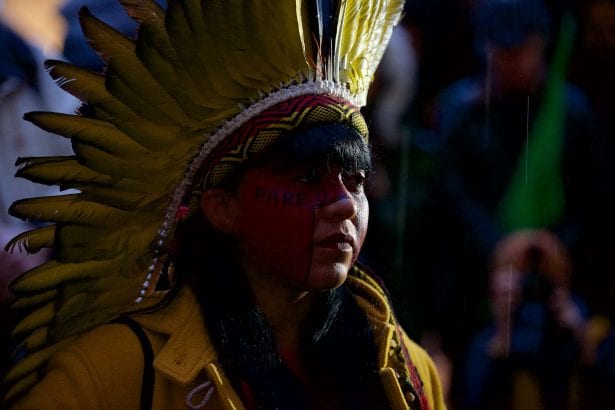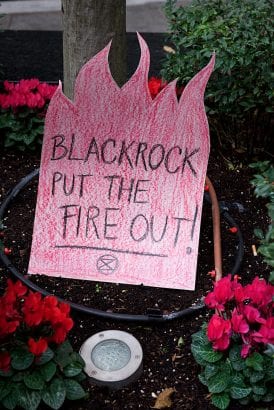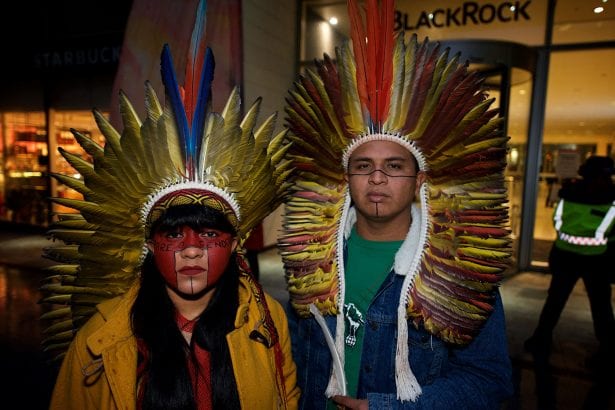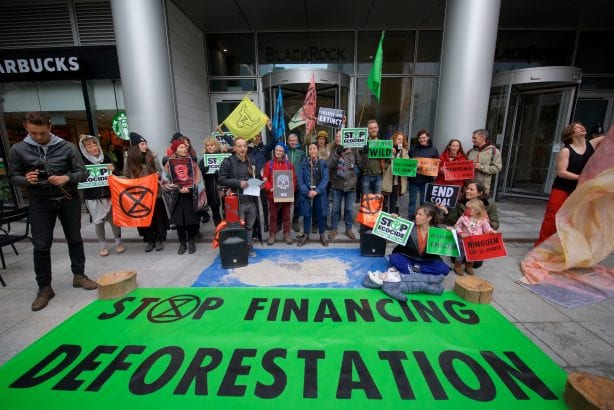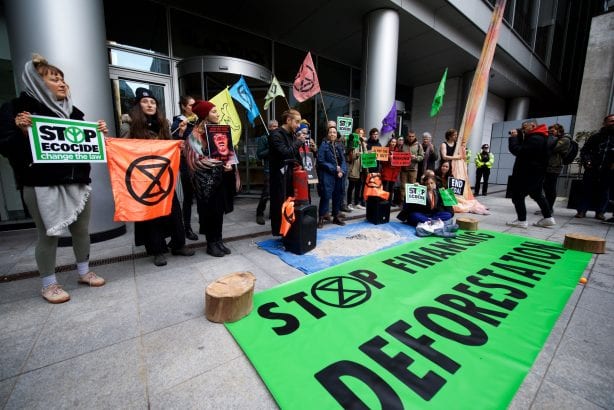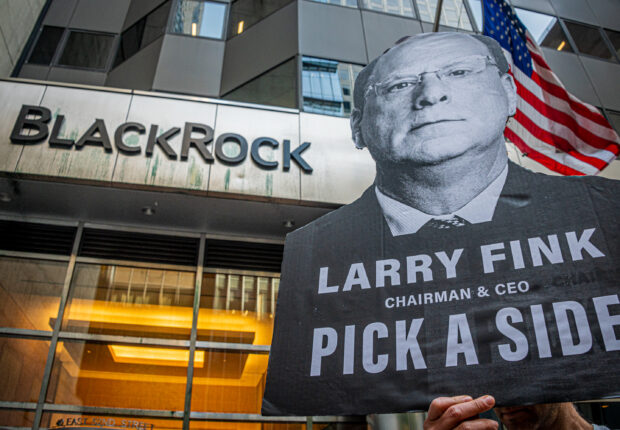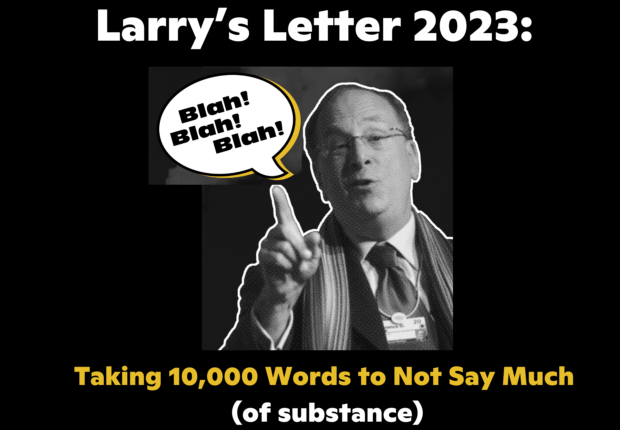XR UK along with an Indigenous delegation from Brazil ran a dramatic protest challenging the firm as a main player driving the climate crisis and deforestation around the world.
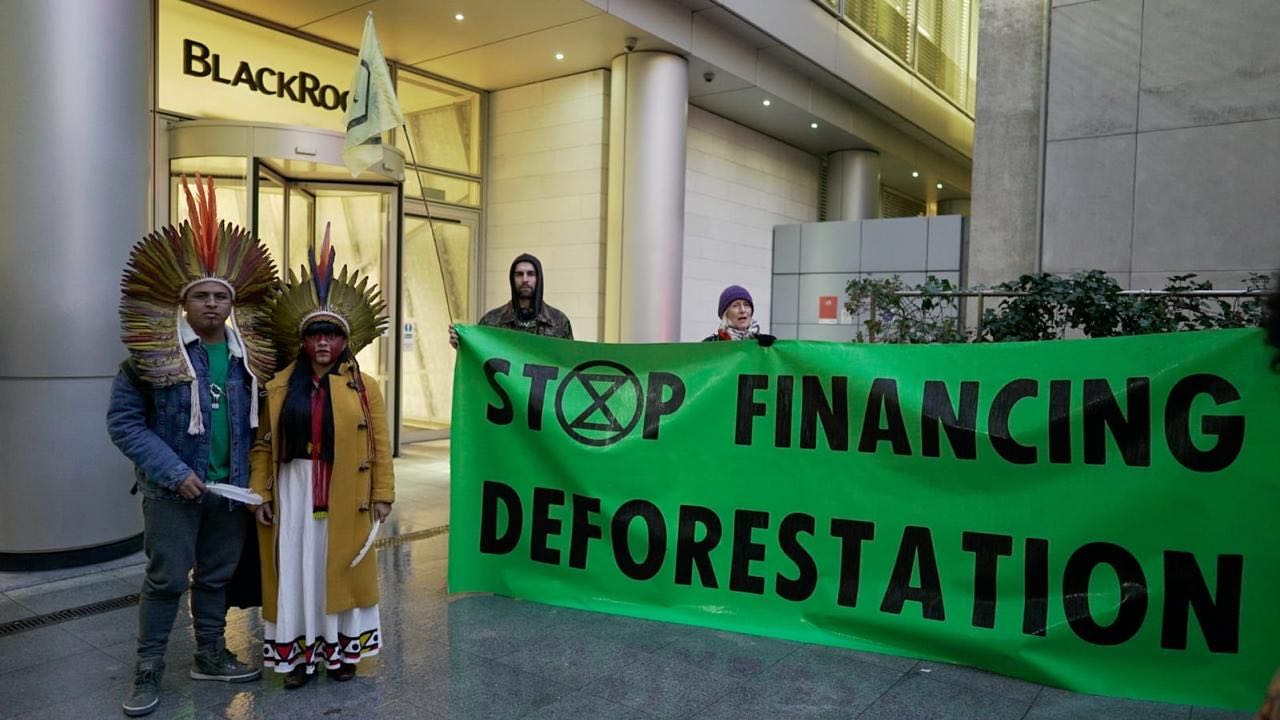
Reposted from the XR Global website:
Today in London, activists gathered out front of the worlds biggest investment firm BlackRock to engage in a dramatic, creative and nonviolent protest to challenge BlackRock as a main player driving the climate crisis and deforestation around the world.
Activists dumped a pile of wood ashes (waste collected from pizza ovens and woodburning stoves) in front of BlackRock’s entrance doors. They will then put on a carnival of flames and ashes with chaotic dance performances, fire-jugglers, musicians, speakers from multiple groups, giving a personal account of the fate their communities and territories face when daily attacked by extrativist industries.
This action intends to bring the heat and destruction of the Amazon rainforest fires to the doorstep of BlackRock, which comfortably sits profiting from the damage its investments create around the world.
BirthStrike founder and Mesadorm singer Blythe Pepino, also active as part of the #XRSnowflakes affinity group, said:
“I’m protesting outside BlackRock because we must keep holding to account the behemoths that are funding and therefore accountable for the destruction and violence of Indigenous lands and people.
I represent the BirthStrike movement, for whom child bearing has become an unbearable idea due to companies like this that have consistently funded our progress towards destruction and undermined the environmental movement towards sustainability.
Supporters and speakers came from groups such as Amazon Watch, Stop Ecocide, Parents for Future, and Animal Rebellion.
The protest stands in solidarity with APIB (Brazilian Indigenous Peoples’ Association) as their delegation visits London as part of their European advocacy tour “Indigenous Blood: Not a Single Drop more”, aiming to draw awareness to the serious violence native people face in Brazil for defending their land and rights.
Through this tour APIB also seeks to inform European governments, trade organisations, and the public opinion about the real source of the Brazilian products consumed in Europe, many times the fruit of human rights violations and conflict areas. APIB is asking an end to European complicity in the destruction of the Amazon Rainforest and the persecution of its native people, for commodities grown on and extracted from their lands.
The delegation continue the tour despite mourning the recent murder of Indigenous ‘Forest Guardian’ Paulo Paulino Guajajara, shot in the face on November 1st by illegal loggers. Fellow Forest Guardian Laercio Guajajara was also hospitalised with gunshot wounds during the ambush. Yesterday, they awarded President Jair Bolsonaro a “Racist of the Year” award during a protest at the Brazilian Embassy in London yesterday in collaboration with Survival International.)
“Companies like BlackRock fund and profit from the businesses exploiting Amazonia. We won’t stand by as Indigenous genocide and the decimation of wildlife continue in the name of ‘business as usual’,” said wildlife biologist James Fox, 25, from London, adding:
“Indigenous communities are scientifically proven to be the best stewards of the natural world, and have been on the global front lines of climate and ecological destruction for generations. The climate movement must support the struggle for Indigenous rights – and BlackRock must divest from this destruction.”
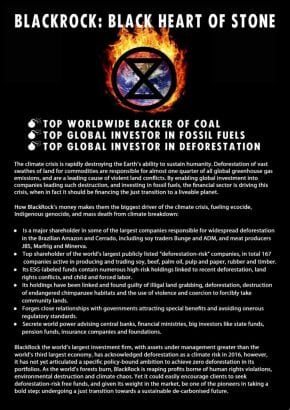
Who are BlackRock?
Until the financial crisis BlackRock was unknown, but after its name was everywhere in the investment world. Nowadays this discreet investment firm surfaces in investigative reports as a lead investor in the crisis of deforestation and land conflict. Its investments in deforestation-risk companies have been increasing since 2014, from a total of $1 billion USD to $1.6 billion USD in 2018, making them top investors in deforestation from Brazilian forests to Indonesia or Borneo.
BlackRock is a major shareholder in some of the largest agribusiness companies responsible for widespread deforestation in the Brazilian Amazon and Cerrado, including soy traders Bunge and ADM, and meat producers JBS, Marfrig and Minerva. Bunge for instances, was among a group of agricultural traders fined by the Brazilian Institute of Environment and Renewable Natural Resources (IBAMA) for purchasing 3,000 tons of soy and other grains from farms embargoed for deforestation. After far-right candidate, Bolsonaro, won the Brazilian elections, BlackRock announced expansion of operations in Brazil.
BlackRock is one of the top three shareholders in 25 of the world’s largest publicly listed “deforestation-risk” companies (94%) through its index funds, potentially increasing further its risks. BlackRock holds shares in 61 of the 167 companies active in producing and trading soy, beef, palm oil, pulp and paper, rubber and timber. Its Environmental, Social and Governance (ESG) labeled funds contain numerous high-risk holdings linked to recent deforestation, land rights conflicts, and child and forced labor.
BlackRock’s holdings have been involved in land grabbing in Indonesia, and found guilty in Liberia of illegal deforestation, destruction of endangered chimpanzee habitats, and the use of violence and coercion to forcibly take community lands.
Aside from deforestation, BlackRock is the largest investor in coal worldwide, including in developing new plants. Coal is the world’s deadliest fossil fuel, damaging people’s health, destroying local ecosystems, and acting as the main driver of climate change worldwide. Is a major investor in Tar sands, worse for climate than any other oil extraction; top shareholder in all the major companies seeking to drill the Arctic; and it is also one of the biggest investors in nearly every oil company operating in the Western Amazon.
Recent oil spills from an unknown source blighting the Northeastern coast of Brazil, which have damaged tourism and local livelihoods in the region that voted majoritarily against President Jair Bolsonaro’s Election, have been met by dismissal from local and National government. State responses include misinformation that contaminated beaches and seafood are ‘safe’, accusations that NGOs are behind the spills, and a lack of state support in clean-up operations – which are being led by fishermen and grassroots groups.
Deforestation and degradation of vast swathes of land for commodities are responsible for almost one quarter of all global greenhouse gas emissions, and are the leading cause of land conflict and death of frontline forest guardians.
As the Amazon rainforest burns and Brazil’s coastline surges with toxic tides, BlackRock is reaping the profits of human rights violations, environmental destruction and climate chaos. As the world’s largest asset manager, controlling more funds than the GDP of Japan, BlackRock could take advantage of its privileged position in the markets, and become a weapon in leading deforestation-risk free funds, and paving the way for a just transition towards a sustainable decarbonised lievable planet.
A global boycott to save the rainforest
Although BlackRock is one of the biggest and most influential companies driving this damage, it’s by no means the only player in the game. APIB and Amazon Watch’s recent ‘Complicity in Destruction’ report highlights the role of large commodity traders such as meatpackers and and agro-industrial producers JBS, Bunge, Mafrig, ADM and Cargill. Brazil’s National Indigenous Mobilisation (MNI) has called for a boycott of commodities such as beef, leather, timber, soy and sugar produced on conflict land to tackle the economic benefits of aggressive land-grabbing and deforestation in Latin America – and Extinction Rebellion are seeking collaboration with other activist groups to answer the call.
The ‘#BoycottForAmazonia’ campaign firstly asks activists to stop buying products linked to Amazon deforestation and human rights abuses, but doesn’t stop there. Activists are encouraged to “#PaintTheStreets”, using protest performances, flyposting, and disruptive counter-advertising to raise awareness of the problem and which companies are profiting from the crisis in Amazonia. Targets for boycotts, divestment and sanctions include companies all across the supply chain contributing to the crisis, from traders like JBS, to financiers like BlackRock and HSBC, through to retailers who stock the products sourced from deforested areas, such as Burger King, McDonalds and Sainsbury’s.
The boycott is set to continue for at least one full year, but could be renewed if companies aren’t seen to take concrete action. A Facebook event promoting the boycott has already attracted several hundred signups.
